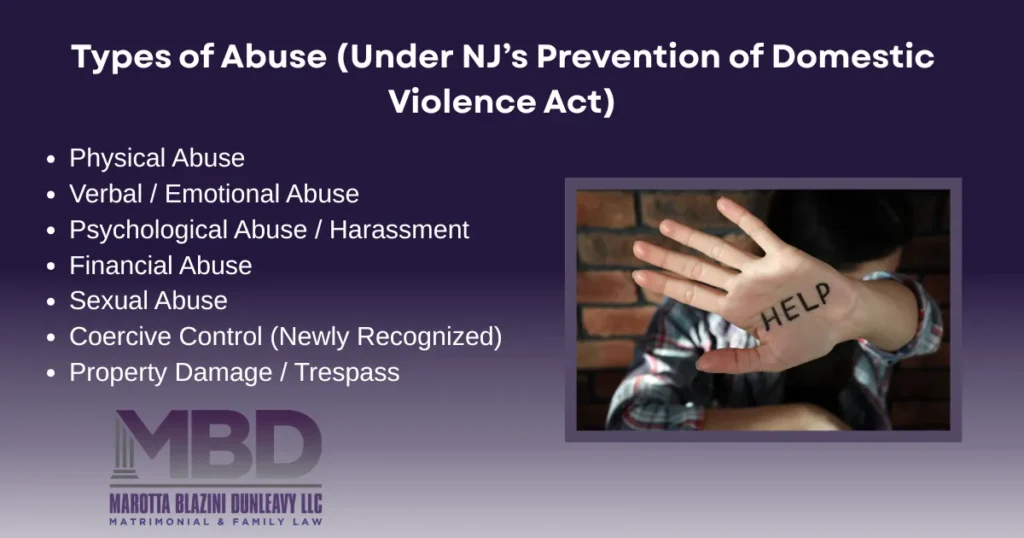Domestic violence involves a pattern of abusive behaviors used to control or intimidate someone in a close relationship. Under New Jersey law, domestic violence is not limited to physical harm but also includes emotional abuse, threats, harassment, stalking, and controlling behaviors.
The New Jersey Prevention of Domestic Violence Act (PDVA) protects individuals who have experienced abuse from a spouse, partner, roommate, family member, or co-parent—regardless of marriage or cohabitation. Examples of domestic violence include:
If you are experiencing any of these behaviors, you may be entitled to legal protection through the family court system.

Domestic violence can significantly impact divorce cases. Whether seeking protection from an abusive spouse or defending against false allegations, domestic violence issues often influence court decisions about parenting time, alimony, and property division.
Common court orders in such cases include:
Safety is paramount. Courts often structure parenting time and communication to avoid direct contact, such as ordering supervised visitation or third-party exchanges.
False accusations of domestic violence can arise during contentious divorces or custody disputes. If you believe you are wrongly accused, it is critical to respond carefully and respectfully. An FRO hearing’s outcome can profoundly affect your rights, including:
Our Bergen County domestic violence lawyers will help you protect your rights and reputation through this sensitive process.
A restraining order is a court-issued order designed to provide immediate protection for victims of domestic violence. In New Jersey, the process usually begins with a Temporary Restraining Order (TRO), which may be granted quickly and without the alleged abuser present. A TRO can:
A hearing is then scheduled shortly after to determine whether a Final Restraining Order (FRO) should be granted, providing long-term protection. Both parties may present evidence and testify at the hearing.
If granted, an FRO may include continued restrictions on contact, housing, finances, and parenting time to ensure ongoing safety.
New Jersey courts must consider any history of domestic violence when deciding:
Many survivors fear confronting their abuser in court. While court appearances may be necessary, especially for restraining orders or custody disputes, Bergen County family courts provide protections such as:
Your lawyer will guide you through this process, work to minimize stress, and explore alternative dispute resolution methods like mediation whenever possible.
You do not have to navigate domestic violence cases alone. With decades of experience, our Bergen County domestic violence lawyers provide compassionate and strategic representation for:
We are dedicated to helping you reclaim safety, rights, and peace of mind.
Leaving an abusive relationship takes courage—and you don’t have to do it alone. Our experienced Bergen County domestic violence lawyers at Marotta Blazini Dunleavy LLC provide the support and guidance needed to build a safer, more secure future free from harm. Call 201-368-7713 or complete our online form to schedule a free consultation. Located in Maywood, New Jersey, we serve clients throughout Bergen County and surrounding areas.
OUR PRACTICE AREAS
CONTACT OUR FIRM
To schedule a consultation with one of our attorneys, fill out the form below!